★★★★½
“Thieves Like Us.”

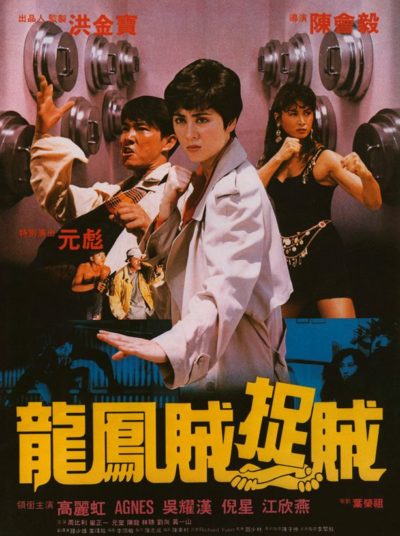 This is an largely over-looked gem, featuring the future Mrs. Samo Hung (Godenzi – they married in 1995) in a role and performance which are so excellent, as to make you wonder why she apparently quit the cinema the following year [though she does have a cameo in Mr. Nice Guy, appearing in the cooking show audience]. She first came to attention in Eastern Condors and, despite a lack of training, developed a graceful, fluid style of action that works well. Her best known vehicle is She Shoots Straight, but for my money, this is even better.
This is an largely over-looked gem, featuring the future Mrs. Samo Hung (Godenzi – they married in 1995) in a role and performance which are so excellent, as to make you wonder why she apparently quit the cinema the following year [though she does have a cameo in Mr. Nice Guy, appearing in the cooking show audience]. She first came to attention in Eastern Condors and, despite a lack of training, developed a graceful, fluid style of action that works well. Her best known vehicle is She Shoots Straight, but for my money, this is even better.
She plays Hung, one of three sisters who are the business end of a family of thieves. Their guardian decides to pass the clan on to Hung, but another sister, Ngan (Aurelio, also from She Shoots Straight) wants control – she fixes a job so that Hung is captured, then takes over operations, using brute force and murder rather than skill and agility on their robberies. Three years later, Hung’s sentence is ended, but her sister immediately frames her again: to avoid jail, Hung agrees to co-operate with the police and work towards capturing her sister. She discovers Ngan has been hired to steal Napoleon’s death-mask, and the film climaxes with the two sisters battling each other inside the warehouse where the treasure is guarded.
This is almost two plots for the price of one, as on the police side, you have the investigating cop (Ng), who has to keep an eye both on his new partner (Ngai Sing) and a swordplay-novel obsessed nephew (Yuen Biao), who both want to help, but together are as much a distraction as an assistance. This lends itself to the usual goofy and unsubtle HK comedy – for example, Ng stripping to his boxers after believing there’s a bomb hidden in them – though these aspects don’t grate nearly as badly as I’ve seen elsewhere. There are also a bunch of cool moments to the plot which are probably unnecessary, in the larger scheme of things, but are thoroughly satisfying, and suggest someone actually thought the script out, again something not always the case in HK action cinema.
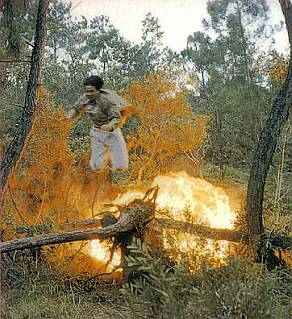 Godenzi is great, putting over a great combination of coolness and charisma, with a confident attitude that’s wholly justified. It’s established in the first scene that she knows how to push her sister’s buttons, and this comes back into play right at the end. Aurelio, a Filipina powerlifting champion, is a little less adept at acting, but is well-cast as the villainess, with a good sneer. There’s one amazing, politically-incorrect exchange between the characters, when they meet for the first time after Hung’s release from jail. Ngan sneers, “You look plump,” to which Hung replies, “Better than you, with sunburn like a nigger!” Ah, the 1990’s…
Godenzi is great, putting over a great combination of coolness and charisma, with a confident attitude that’s wholly justified. It’s established in the first scene that she knows how to push her sister’s buttons, and this comes back into play right at the end. Aurelio, a Filipina powerlifting champion, is a little less adept at acting, but is well-cast as the villainess, with a good sneer. There’s one amazing, politically-incorrect exchange between the characters, when they meet for the first time after Hung’s release from jail. Ngan sneers, “You look plump,” to which Hung replies, “Better than you, with sunburn like a nigger!” Ah, the 1990’s…
But this one is less about offensive banter, than action scenes which are top-notch, from the opening practice duel between the sisters, through to the final battle – this time for real. It’s particularly inventive as, early on, the sisters have to fight each other without making a sound, to avoid alerting the guards The highlight is, however, probably an amazing fight in a car-park – one of the top locations for mayhem in HK films, right up there with restaurants and warehouses – where everyone bar Aurelio gets involved. Her role as top villain there is delegated to Billy Chow, who went toe-to-toe with Jet Li in Fist of Legend, and he’s one hell of a formidable opponent. The action choreography is credited to Lee King-chu, but I suspect producer Samo Hung had more than a little involvement.
There is little or no depth here, only really what Godenzi brings to the table. But there is, equally, little or no intent of depth either: this was created purely as entertainment, nothing more, and on that level it succeeds admirably. It’s a real shame Godenzi chose not to follow a career as an action actress since, on this showing, she could well have ended up as big a star in the field as Michelle Yeoh.
[A note on spelling. The sleeve says ‘LicenCe’, but the print goes with the S. The former is also grammatically inaccurate, so I’ve gone with the S spelling throughout this article.]
Dir: Billy Chan
Stars: Joyce Godenzi, Agnes Aurelio, Richard Ng, Alvina Kong





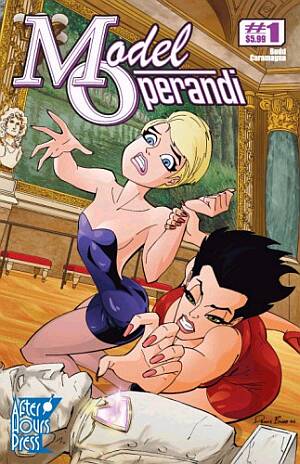
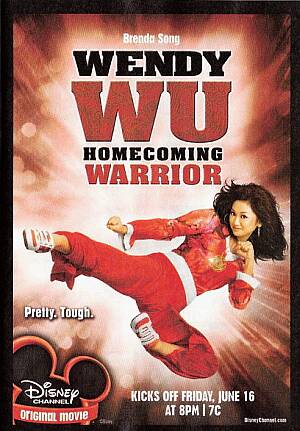 It’s kinda sad to say, but the action in this Disney TV movie kicks the ass of, not only most TV shows, but a credible number of Hollywood films. Then again, behind the fights here is Koichi Sakamoto, who is also responsible for Drive, among the best American martial-arts films of all time. And while obviously “Disneyfied”, this is still sprightly and engaging, with a couple of very decent fight sequences. It is, however,
It’s kinda sad to say, but the action in this Disney TV movie kicks the ass of, not only most TV shows, but a credible number of Hollywood films. Then again, behind the fights here is Koichi Sakamoto, who is also responsible for Drive, among the best American martial-arts films of all time. And while obviously “Disneyfied”, this is still sprightly and engaging, with a couple of very decent fight sequences. It is, however, 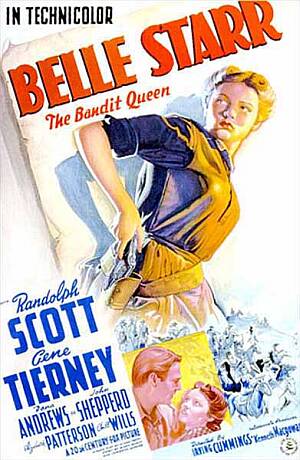 There’s something startlingly incorrect about this 1941 film, which makes its heroine, Belle (Tierney), an unrepentant Confederate mansion owner. She regrets the end of the Civil War and joins a rebel group who keep fighting, marrying their leader Sam Starr (Scott), only to find their morality may not quite live up to her own. It’s interestingly even-handed, with neither side being “good” or “bad”; Belle blames the Yankees for the death of her father and the burning of her home, but the leader of their forces, Major Grail (Andrews) is a sympathetic character who carries a torch for Belle. Naturally, given the era, Belle is more of an assistant, loading Sam’s rifles during a gun-battle, rather than firing them herself and it’s remarkable how her hair and dresses remain impeccable, even when she’s livin’ la vida outlaw. However, she’s a fine, independent-minded heroine, prepared to take decisive action to support her beliefs – highly dubious though they may be.
There’s something startlingly incorrect about this 1941 film, which makes its heroine, Belle (Tierney), an unrepentant Confederate mansion owner. She regrets the end of the Civil War and joins a rebel group who keep fighting, marrying their leader Sam Starr (Scott), only to find their morality may not quite live up to her own. It’s interestingly even-handed, with neither side being “good” or “bad”; Belle blames the Yankees for the death of her father and the burning of her home, but the leader of their forces, Major Grail (Andrews) is a sympathetic character who carries a torch for Belle. Naturally, given the era, Belle is more of an assistant, loading Sam’s rifles during a gun-battle, rather than firing them herself and it’s remarkable how her hair and dresses remain impeccable, even when she’s livin’ la vida outlaw. However, she’s a fine, independent-minded heroine, prepared to take decisive action to support her beliefs – highly dubious though they may be. Despite influences all over the place – Assault on Precinct 13, Aliens, Night of the Living Dead, The Magnificent Seven – Siri takes and runs with them very effectively. Laborie (Farès) is a career soldier, tasked with transporting an Albanian gangster to his trial; but the convoy is ambushed, so she and her men hole up in a nearby warehouse on a deserted industrial estate. However, it is being robbed by brothers Santino (Magimel) and Nasser (Naceri), plus their crew – and the attackers have also followed them, intent on rescuing their boss. Can they survive until help arrives?
Despite influences all over the place – Assault on Precinct 13, Aliens, Night of the Living Dead, The Magnificent Seven – Siri takes and runs with them very effectively. Laborie (Farès) is a career soldier, tasked with transporting an Albanian gangster to his trial; but the convoy is ambushed, so she and her men hole up in a nearby warehouse on a deserted industrial estate. However, it is being robbed by brothers Santino (Magimel) and Nasser (Naceri), plus their crew – and the attackers have also followed them, intent on rescuing their boss. Can they survive until help arrives? Our once-favourite TV show walks off into the sunset – literally – and we are confirmed in our belief that it is very, very hard to keep interest in a series going past the third season. Especially if you’re creator JJ Abrams, who was missing, presumably making the very Alias-like Mission Impossible III; he didn’t even return to write or direct the season finale. It was, on the whole, a credible stab at trying up loose ends: Rambaldi, the question of whether Sloan was good or evil, Syd’s relationship with her mother, and the real identity of Vaughan, about to be revealed at the end of season four, when he and Sidney were in a car-wreck. This led into the main arc of the series, a hunt for ‘Prophet 5’, a shadowy organization intent on the usual things shadowy organizations want. As opposed to, say, the Alliance, the Covenant, K-Directorate, SD-6, etc…
Our once-favourite TV show walks off into the sunset – literally – and we are confirmed in our belief that it is very, very hard to keep interest in a series going past the third season. Especially if you’re creator JJ Abrams, who was missing, presumably making the very Alias-like Mission Impossible III; he didn’t even return to write or direct the season finale. It was, on the whole, a credible stab at trying up loose ends: Rambaldi, the question of whether Sloan was good or evil, Syd’s relationship with her mother, and the real identity of Vaughan, about to be revealed at the end of season four, when he and Sidney were in a car-wreck. This led into the main arc of the series, a hunt for ‘Prophet 5’, a shadowy organization intent on the usual things shadowy organizations want. As opposed to, say, the Alliance, the Covenant, K-Directorate, SD-6, etc…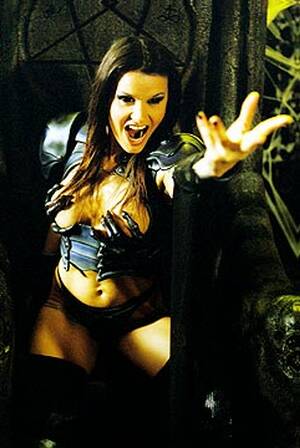

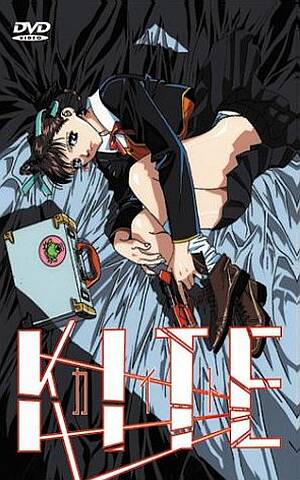 Concerns about some content here means Kite has had a tortuous release in the West. First time out, in 1998, it was shorn basically of all explicit sexual content: given the potentially underage nature of the animated heroine, Media Blasters didn’t want to be hit with a kiddie porn charge – laughable though that may seem for a “cartoon”! – and played it very safe. Subsequent releases over the next six years restored first much, in the “Director’s Cut”, then all (“Special Edition”) the footage, but the OAV* might just work better without the sex. It’s hardly as if I finished it and thought, “Y’know, what this really needs is some sequences of the heroine getting
Concerns about some content here means Kite has had a tortuous release in the West. First time out, in 1998, it was shorn basically of all explicit sexual content: given the potentially underage nature of the animated heroine, Media Blasters didn’t want to be hit with a kiddie porn charge – laughable though that may seem for a “cartoon”! – and played it very safe. Subsequent releases over the next six years restored first much, in the “Director’s Cut”, then all (“Special Edition”) the footage, but the OAV* might just work better without the sex. It’s hardly as if I finished it and thought, “Y’know, what this really needs is some sequences of the heroine getting 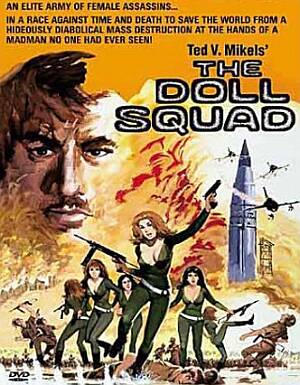 To describe this as eagerly anticipated would be… well, wholly wrong, actually. I’ll tell you how long the DVD has sat on our shelf: I bought it on
To describe this as eagerly anticipated would be… well, wholly wrong, actually. I’ll tell you how long the DVD has sat on our shelf: I bought it on 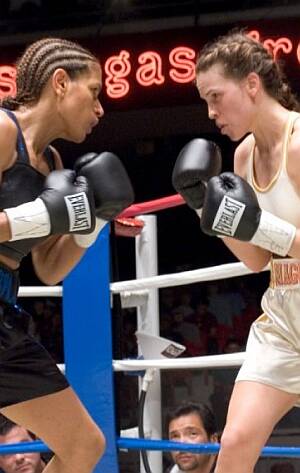 The problem with boxing films is that it’s very hard to avoid the obvious cliches. Kid from the streets, initially seen as hopeless, eventually convinces a trainer to take them on, and struggles towards the goal of a shot at the big time. Million is no different, for the first two-thirds at least. Then, there is a sudden, unexpected swerve – or would have been unexpected, if our son hadn’t ruthlessly spoilered it, by wandering in and telling us of a scene in Scary Movie 4 which spoofed it. Thank you, Robert. :-) This shifts the movie in a radically different direction, though also divorcing it entirely from the action heroine genre and robbing it of at least half a grade, since reviews here center around such aspects.
The problem with boxing films is that it’s very hard to avoid the obvious cliches. Kid from the streets, initially seen as hopeless, eventually convinces a trainer to take them on, and struggles towards the goal of a shot at the big time. Million is no different, for the first two-thirds at least. Then, there is a sudden, unexpected swerve – or would have been unexpected, if our son hadn’t ruthlessly spoilered it, by wandering in and telling us of a scene in Scary Movie 4 which spoofed it. Thank you, Robert. :-) This shifts the movie in a radically different direction, though also divorcing it entirely from the action heroine genre and robbing it of at least half a grade, since reviews here center around such aspects.